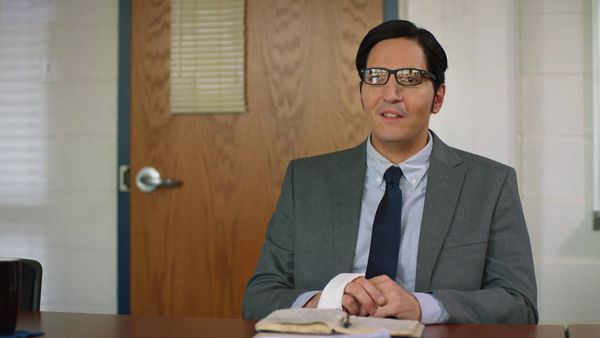Eye For Film >> Movies >> The Teacher (2016) Film Review
The Teacher
Reviewed by: Amber Wilkinson

Children's stories are peppered with tales of evil schoolmistresses - from the likes of Enid Blyton's Dame Slap, who set riddles that couldn't be answered, to Roald Dahl's "bloodthirsty" Miss Trunchbull and JK Rowling's kitten-loving Professor Umbridge - a familiar grounding that lends Jan Hrebejk and his regular writing collaborator Petr Jarchovsý's The Teacher a universal quality despite its very specific period setting. Except, this is no fairy tale.
Mária Drazdechová (Zuzana Mauréry, who deservedly took home a prize at Karlovy Vary for the role) is cut from the same cloth as Umbridge, with a penchant for flowery skirts and nice shoes, she's all smiles as we watch her arrive to her new class of young secondary school kids. It could be anywhere, except it's not, because the time is 1983 and the place Bratislava, setting it firmly within the final years of Communist rule and its attendant "reluctant terror".

Those two words perfectly sum up the sense of dread that gradually accumulates around Drazdechová like a bad perfume, although Hrebejk and Jarchovsý deftly employ humour as a way of mocking and undercutting their anti-heroine while preventing their overall point about power and corruption from becoming preachy. The writing is on the blackboard almost from the start, as Drazdechová starts to learn her pupils' names, being sure to introduce herself first as the widow of a top-ranked military officer, before jotting each child's name down in her notebook alongside a description of their parents' occupations.
Hrebejk and Jarchovsý create intrigue by taking a non-linear approach to the narrative, cutting between these scenes which gradually show Drazdechová working out a game plan of manipulation and a parent/teachers gathering a year later, called as a result of a calamitous event, not revealed until deep in the runtime, where they are discussing a petition to sack her. Scenes with the parents have a 12 Angry Men type of claustrophobia, as gradually we see battle lines drawn between those who dare speak, while fear marks out those who don't.
Flicking back to the previous school year, Drazdechová starts to construct a kingdom of minions to serve her every need, whether it is getting her hair cut for free or having the kids do her shopping in return for hints and tips on how to get a top grade. The trouble starts when one of two of the parents refuse to indulge her every whim, leading to classroom reprisals.
Hrebejk's lightness of touch emphasises Drazdechová's awfulness all the more. We may be laughing at the fact she is thwarted over a lamp that continually breaks but just because she is absurd on one level doesn't stop her from making her pupils' lives a living hell. This morality tale probes at questions of solidarity - if you've managed to feather your own nest do you care that your neighbours' chicks are falling from theirs? It also shows how a climate of fear is easily constructed if everybody is willing to contribute a brick - a universal consideration that has implications far beyond the school gates.
Reviewed on: 14 Jul 2016















